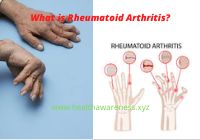What is rheumatoid arthritis?
What are the main
signs and symptoms associated with it?
The main signs and
symptoms of this condition are: Fatigue. Anemia. Painful lump. Dry eyes and
mouth. Stiff flesh on elbows, hands, knees and other joints. Redness and
swelling in the joints. Chest pain. Fever and weight loss. The painful
condition affects both hands and feet at the same time. It can start anytime
after 30 years and affects more women than men. Sometimes, flare-ups, that is,
pain and fatigue can occur suddenly with inflammation and make the condition
worse.
What are the main Cause of Rheumatoid Arthritis?
Although the exact
cause of this condition is not yet known, the following factors may be
considered as precursors of this condition:
Gene mutations.
Someone in the
father's family has this disorder.
Infection.
Hormonal changes.
Mental depression.
Smoking.
Come in contact
with pollutants.
How is it diagnosed and treatment of Rheumatoid Arthritis?
The disease is
diagnosed by looking at the above symptoms. Also, physical examination, X-ray
and blood test confirm the presence of this disease. Treatment is more
effective if the disease is diagnosed very early and treatment is started.
Treatment of Rheumatoid Arthritis:
Treatment is both pre-emptively and reactive, such as painkillers or analgesics. Nonsteroidal anti-inflammatory drugs such as ibuprofen. Corticosteroids such as prednisolone. Anti-rheumatic drugs such as methotrexate to reduce the incidence of the disease. Biological drugs such as, Infliximab. Exercises, such as strength training and tai chi. Physiotherapy to reduce pain and restore mobility in the joints. Ingredients that will relieve pain and stress. Rest. Eat healthy foods and add omega 3 fatty acids to your diet. Massage, acupuncture and other complementary therapies.
Home Remedies for
Rheumatoid Arthritis
Exercise - Low
impact exercises, some light yoga, etc. can reduce the stiffness of the joints
and increase the strength of the muscles as a result of the exercise.
Adequate rest -
Adequate rest and sleep help control pain and weakness
Cold and hot - Cold
compresses or ice control muscle pain and inflammation and sudden tightening of
the muscles. On the other hand, bathing in hot water and hot roasting relieves
muscle stiffness.
Food
Foods that are high in omega-3 fatty acids, such as:
Oily fish
Chia seeds
Flax seeds
Walnut
Foods rich in
vitamins A, C, E and selenium, antioxidants, such as -
Berry
Dark chocolate
Rajma
Spinach
Hundreds of
products
Green tea
Broccoli
Grapes
Medications for
rheumatoid arthritis
In rheumatoid
arthritis, medications are given to reduce pain and inflammation, and to
control bone loss.
Nonsteroidal anti-inflammatory drugs
Corticosteroids
Acetaminophen
The above medicines
are easily available in the drug stores without any prescription and they help
to reduce the pain.
Also, medicines
that help control the amount of physical damage caused by rheumatoid arthritis
are:
Disease-modifying
antirheumatic drugs (DMARDs). রাখ Controls
rheumatoid arthritis by lowering the body's immune system activity.
Biologics - These
drugs control inflammation only in the affected area without lowering the
body's immunity.
Janus kinase (JAK)
inhibitors. - It is also a new type of DMARDs that try to control the body's
immune system to reduce the incidence of the disease.
Types of Rheumatoid
Arthritis
Seropositive RA:
Blood tests can detect positive rheumatoid factor, meaning antibodies that
force the immune system to attack the bone marrow.
Seronegative RA: If
there is a negative RF blood test, negative Anti CCP result and accompanying
symptoms of rheumatoid arthritis, then it is seronegative RA
Juvenile Idiopathic
Arthritis: This arthritis occurs in children 18 years of age and below, although
it has other symptoms, it affects growth and causes inflammation in the eyes.
Is Rheumatoid
Arthritis Hereditary?
Rheumatoid arthritis is not a hereditary disease, although it is found in different members of the same family. Natural causes, heredity or a combination of the two can be the cause of this disease. If anyone in your family has rheumatoid arthritis and you have pain in your hands and feet, numbness in the joints, swelling, redness, etc., consult a doctor as soon as possible without delay.

Post a Comment